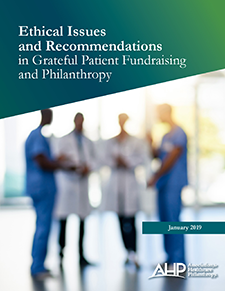Ethical Issues and Recommendations in Grateful Patient Fundraising and Philanthropy
Published: 01/28/2019

Grateful patients provide substantial philanthropic funding for health care institutions, resulting in important societal benefits. Although grateful patient fundraising (GPFR) is widespread, it raises an array of ethical issues for patients, physicians, development professionals, and institutions. These issues have not been described comprehensively, and there is insufficient guidance to inform the ethical practice of GPFR.
Consequently, the authors convened a “Summit on the Ethics of Grateful Patient Fundraising,” with the goal of identifying primary ethical issues in GPFR and offering recommendations regarding how to manage them. Participants were 29 experts from across the United States who represented the perspectives of bioethics, clinical practice, development, law, patients, philanthropy, psychology, and regulatory compliance. Intensive discussions resulted in articulating ethical issues for physicians and other clinicians (discussions with patients about philanthropy; physician-initiated discussions; clinically vulnerable patients; conflicts of obligation and equity regarding physician’s time, attention, and responsiveness and the provision of special services; and transparency and respecting donor intent) as well as for development officers and institutions (transparency in the development professional–donor relationship; impact on clinical
care; confidentiality and privacy; conflicts of interest; institution–patient/donor
relationship; concierge services for grateful patients; scientific merit and research
integrity; transparency in use of philanthropic gifts; and institutional policies and
training in responsible GPFR).
While these recommendations promise to mitigate some of the ethical issues associated with GPFR, important next steps include conducting research on the ethical issues in GPFR, disseminating these recommendations, developing standardized training for clinicians regarding them, and revising them as warranted.
Read the full report.
Authors:
Megan E. Collins, MD, MPH
Steven Rum, MPA
Jane Wheeler, MSPH
Karen Antman, MD
Henry Brem, MD
Joseph Carrese, MD, MPH
Michelle Glennon, JD
Jeffrey Kahn, PhD, MPH
E. Magnus Ohman, MD
Reshma Jagsi, MD, DPhil
Sara Konrath, PHD
Stacey Tovino, JD, PhD
Scott Wright, MD
Jeremy Sugarman, MD, MPH, MA
for the Participants in the Summit on the Ethics of Grateful Patient Fundraising
Lead Partners:
Johns Hopkins Medicine Philanthropy Institute
Johns Hopkins Berman Institute of Bioethics
Association for Healthcare Philanthropy
Originally published in
Academic Medicine: November 2018 - Volume 93 - Issue 11 - p 1631–1637
doi: 10.1097/ACM.0000000000002365
Learn more about the development of these guidelines in an
interview with author Steven Rum, MPA.